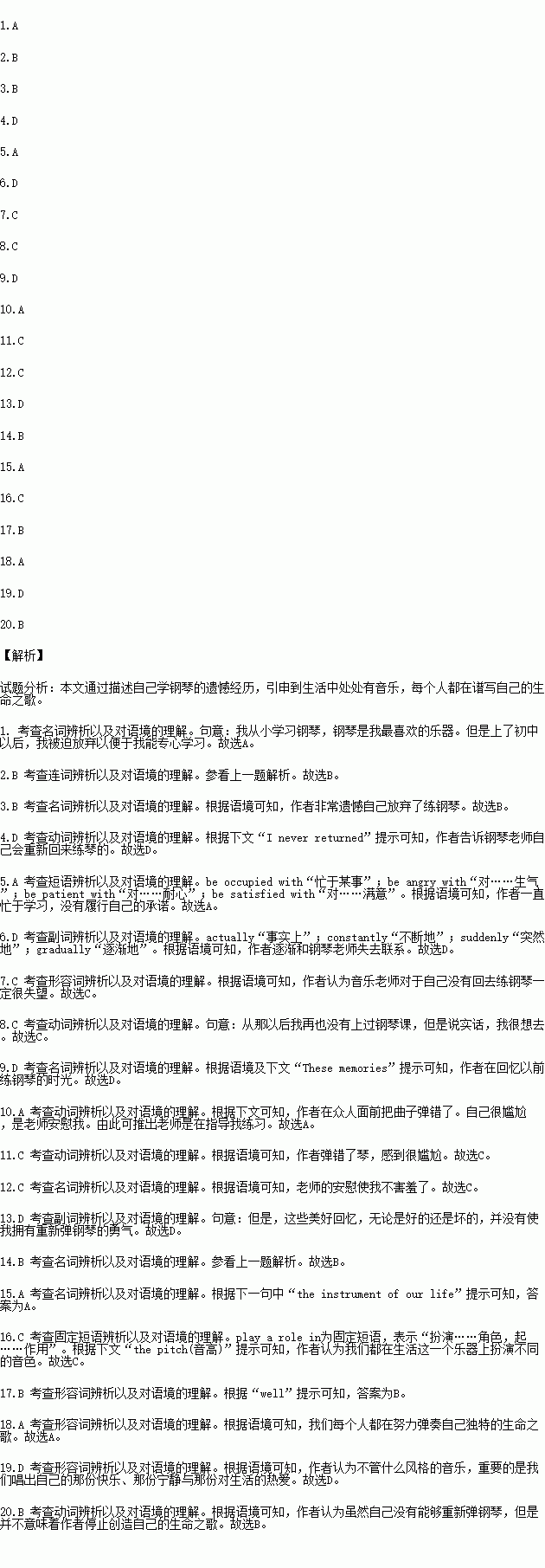题目内容
As a child, I started learning to play the piano, my favorite musical ________, but I was forced to give up when I started my middle school ________ I could concentrate more on my studies.
It’s one of my biggest ________ to stop practicing the piano when I recall sadly today. During the following years, I kept telling my piano teacher that I would ________. However, I didn’t keep my promise because I was ________ with my study. ________ I lost touch with my teacher. Some years later, my teacher died. I was very sad because I lost such a good teacher. She was a very warm and gentle person. It hurts me to think she may have been ________ that I never returned. I haven’t taken lessons since then but to be honest, I ________ to. Sitting at the piano, I couldn’t help recalling many ________ — times of my practising at home and playing before my teacher and one time my teacher ________ me after I played entire pieces of music wrong in front of her colleagues. I was so ________ that I could hardly say anything. But her ________ helped me ease my shame. These memories, ________, good or bad, never caused my ________ for playing the piano again.
This thought then led me to think that ________ is like music, and that we all try to play different ________ in the instrument of our life. Sometimes the pitch(音高) is ________ when we play it well, but sometimes we are out of tone. However, we all continue to create our own ________ style of music. No matter what style our music is, it is ________ that we sing the songs of joy, quietness and love. Though I may never make it back to piano lessons, it doesn’t ________ that I’ve stopped making music.
1.A. instrumentB. performanceC. roomD. stage
2.A. in thatB. so thatC. now thatD. except that
3.A. successesB. regretsC. decisionsD. hobbies
4.A. playB. graduateC. leaveD. return
5.A. occupiedB. angryC. satisfiedD. patient
6.A. ActuallyB. ConstantlyC. SuddenlyD. Gradually
7.A. astonishedB. gladC. disappointedD. amazed
8.A. likedB. neededC. wantedD. decided
9.A. dreamsB. expressionsC. wordsD. memories
10.A. instructedB. hurtC. punishedD. respected
11.A. frightenedB. movedC. embarrassedD. excited
12.A. happinessB. satisfactionC. comfortD. sigh
13.A. insteadB. meanwhileC. thereforeD. however
14.A. hopeB. courageC. feelingD. effect
15.A. lifeB. learningC. attitudeD. enjoyment
16.A. cardsB. sportsC. rolesD. games
17.A. hardB. wonderfulC. surprisingD. complex
18.A. uniqueB. boringC. commonD. similar
19.A. necessaryB. strangeC. possibleD. important
20.A. matterB. meanC. reportD. appear
 孟建平小学滚动测试系列答案
孟建平小学滚动测试系列答案 黄冈天天练口算题卡系列答案
黄冈天天练口算题卡系列答案

